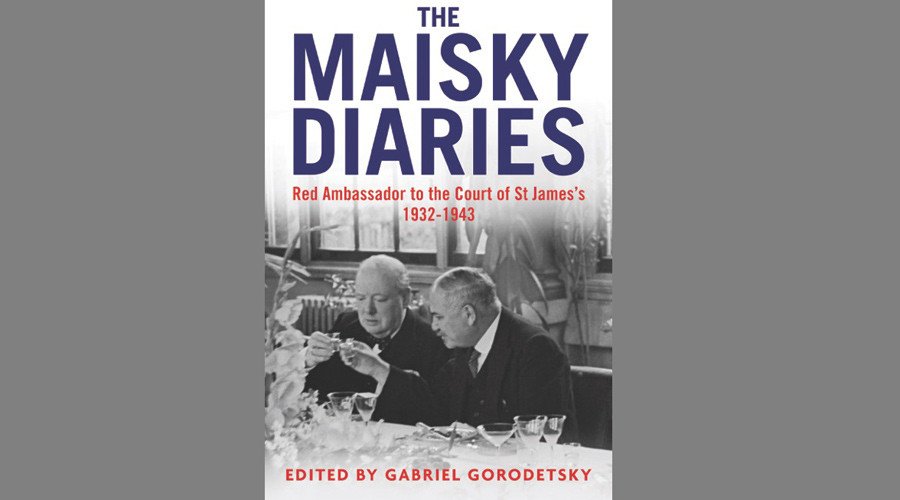Red Ambassador: Wartime diaries of Soviet diplomat Ivan Maisky published in English
Ivan Maisky, Moscow’s wartime ambassador to London, witnessed a tumultuous era of East-West relations from a unique perspective. Israeli-born Oxford historian Prof Gabriel Gorodetsky introduces Maisky’s diaries, translated into English for the first time.
Stalin’s terror and purges of the 1930s discouraged any Soviet official from putting a pen to paper, let alone keeping personal diaries. Serendipity often lies at the heart of scholarly discoveries.
I was absolutely thrilled when by sheer chance I came across the diary of Ivan Maisky, Soviet ambassador to London, 1932-1943, while working on the official publication of Soviet-Israeli relations in the archives of the Russian Foreign Ministry.
Born in 1884, Maisky’s early revolutionary activities led in 1902 to his expulsion from St. Petersburg University and exile, first to Siberia and then to London, where he spent the years 1912-17. It was during his years in exile, followed by two years of service in the British embassy in the mid-twenties, that Maisky mastered the English language, history and culture and established a wide circle of friends from the political, intellectual as well as literary circles.
As the Soviet ambassador to London, Maisky had a front-row seat at some of the most pivotal events of the interwar era and the Second World War. No personal document of such breadth, value and size, written by a major Soviet official during Stalin’s great terror, had ever emerged from the Russian archives.
In its full version it encompasses more than 1,500 pages and will be published next year by Yale University Press with substantial commentary by me. To make it more accessible to a wider public, I have just published with Yale a compendium of selections from the diary. Obviously it was necessary to provide a critical commentary for it, considering the obvious missing dimensions and how much needs to be read between the lines. My commentary therefore juxtaposes the diary with vast archival material unearthed in the Russian, British and American archives, as well as multitude collections of private papers.
Unlike any other historical source to have emerged from the Russian archives the diary conveys a strong personal voice and discloses the pivotal role played by the human factor, transcending controversies over policy and ideology. Like Churchill, Maisky, surprisingly, hails the role of ‘great men’ in history, fully conscious of his own central role in shaping history rather than the Marxist determinist interpretation.
Equally astounding is the revolutionary style of diplomacy heralded by Maisky, which at the time irritated many of his interlocutors, but which has since been so much in vogue. He certainly was the first ambassador to systematically manipulate and mold public opinion, mostly through the press.
A superb ‘public relations’ man, at a time when the concept hardly existed, Maisky did not shy away from aligning himself with opposition groups, backbenchers, newspaper editors, trade unionists, writers, artists and intellectuals. He colluded with the opposition of Churchill, Eden, Beaverbrook and Lloyd George seeking to sway Chamberlain from appeasing Hitler towards an alliance with the Soviet Union.
No less surprising is the extent to which Maisky, despite his incriminating Menshevik past, succeeded in preserving a high degree of integrity and independence and left a striking imprint on the formulation of Soviet foreign policy. The diaries establish that the harsh reality of the rise of Nazism dictated a shift from attempts to mobilize socialist solidarity and support for the Russian Revolution among Labour circles and leftist sympathizers, to courting the Conservatives, who were – as Litvinov, the Soviet commissar for foreign affairs never tired of stressing to Maisky – “the real bosses in Britain!”

The close friendships Maisky struck with top British politicians and officials, as well as with intellectuals and artists, gave him a perfect vantage point. His diary records conversations with David Lloyd George, Neville Chamberlain and Winston Churchill, as well as with Lord Halifax, Anthony Eden, Lord Beaverbrook, John Maynard Keynes and many others. It bears witness to 11 dramatic years starting with the drift towards the war throughout the 1930s, appeasement in the Munich era, the negotiations leading to the signature of the Molotov-Ribbentrop Pact, the Battle of Britain, Churchill’s rise to power and the events leading to the German invasion of Russia, as well as the forging of the Grand Alliance following Hitler’s invasion of Russia in June 1941.
The secret diaries of London’s wittiest and favorite Russian, kept under lock and key, further reveals how chances to avoid the Cold War were lost and how the ambassador did not fear risking his life to keep the Grand Alliance alive. They further disclose how Churchill misled Stalin about the second front and how the prime minister was distrusted even by his own colleagues, who were only happy to share their feelings with the Soviet ambassador. It is stunning to discover that much of the information the Kremlin gleaned from London hardly came from spies, such as ‘the Cambridge five,’ but was rather garnered by Maisky directly from British politicians and officials, whom he befriended such as Beaverbrook, Lloyd George, Eden, Vansittart and even Churchill – all of whom spoke candidly and openly with the Soviet ambassador, sharing with him at time, “heaps of cipher telegrams.”
There are relevant lessons to be drawn from the diary, particularly when history is being appropriated and abused by politicians of all countries and political shades. The diary acquaints us with a sharp-eyed witness, who was at the center of the events leading to the war, and whose outstanding record stands up to correct our often misguided and distorted analogies to those formative years. It reminds us how preconceived ideas in both the West and in Russia, entrenched in a long tradition of imperial rivalries and cultural differences, had brought the world to the brink of disaster and failed to secure a solid peace in the wake of World War II.
Mutual suspicion, it emerges from Maisky’s diary, was the most important contributor to the calamitous events, leading to the failure of collective security, the Munich conference and the signing of the Molotov- Ribbentrop Pact which precipitated the outbreak of the war. It reveals the efforts of an exceptional, perceptive ambassador to eradicate such misunderstandings, desperately seeking a dialogue and mediation between London and Moscow, whose genuine interests as the two major powers on the edge of Europe, he believed, had coincided throughout history.
Professor Gabriel Gorodetsky, for RT
Gabriel Gorodetsky, The Maisky Diaries, Red Ambassador to the court of St James’s is published by Yale University Press, September 2015.
The statements, views and opinions expressed in this column are solely those of the author and do not necessarily represent those of RT.













